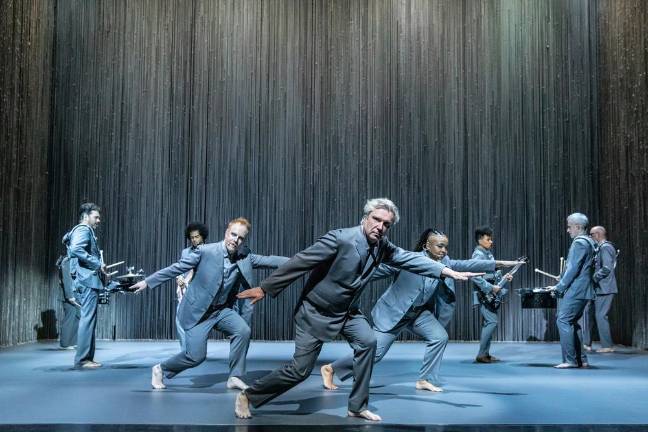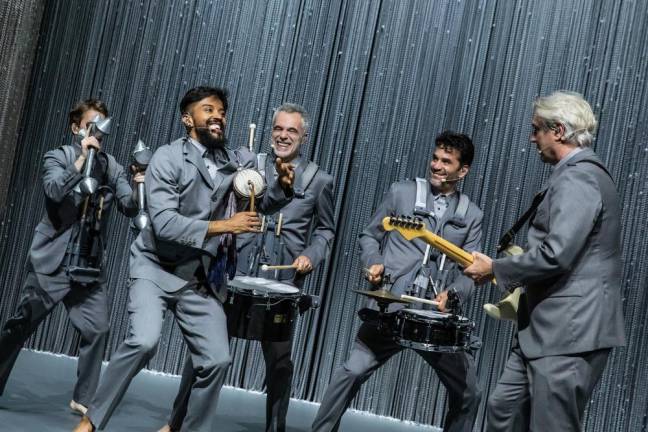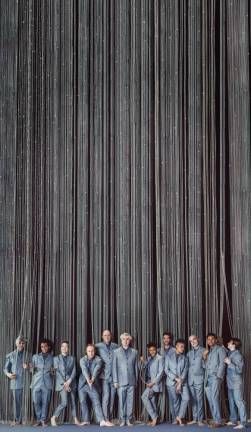As we return to a new normal, over a year after the start of the pandemic, Broadway is seeing a revival of its own — and at time when we could all use a little “Once in a Lifetime” feeling.
At the start of the pandemic in March 2020, Broadway went for dark the first time since the Spanish Flu in 1919. This sent the lives of entertainers everywhere into limbo as productions went on pause.
David Byrne’s “American Utopia” had finished its stay on Broadway and subsequent cross-country tour, totaling around 300 shows, in February 2020 before the pandemic. The show, set to return to Broadway’s St. James Theatre on September 17, is comprised of 12 band members, including Byrne — most of whom are Broadway outsiders with strong backgrounds in music — and several of them are people of color. Having equal representation has always been a part of this show.
As Byrne wrote in a note in 2019 published on the show’s website, “American Utopia” did not come together all at once, but rather it “evolved organically” over time during the planning stages. As Byrne recorded the songs for his “American Utopia” album, the idea came to him to play it live.
The New York Times’ co-chief theater critic Ben Brantley, like several others, compared Byrne to Mister Rogers in his 2019 review upon the show’s original Broadway debut.
“In “David Byrne’s American Utopia” — an expansive, dazzlingly staged concert — he emerges as an avuncular, off-center shepherd to flocks of fans still groping to find their way. Like him, or the version of himself he presents here, they’re heading into the twilight, wondering why the hell they haven’t grown up yet,” Brantley wrote.
Without the confines of cords or equipment, the band members, with their various instruments (mostly drums), don matching suits and perform in grayscale. Daniel Freedman and Jacquelene Acevedo, two of the band’s six percussionists, spoke about to Our Town about the show.
“It’s not just 12 musicians on stage behind their instruments, but it’s 12 musicians also moving through space while playing together,” said Freedman. “So it adds another it that adds almost intangible unity and quality to the music side that, you know, it’s really rare ... and I’ve noticed that on a personal level, it’s changed the way I perceive music and think about music and its relation to dance and performance.”
“A Good Example”
The show was originally slated to resume last fall. September 17, 2021 seemed “doable” though, according to Freedman. After not seeing each other since Feb. 2020, the band began rehearsals in the last week of August.
After a year of a country in turmoil, the question is: how will Broadway meet the moment?
“Back on tour when we started the show, we were always saying their names,” Freedman said of the BIPOC victims of gun violence. “And, so I think it’s American Utopia sets a good thing set a good example for other shows, hopefully, in the future.”
Freedman and fellow percussionist Acevedo both said that from the beginning Byrne’s vision has been to make to show more diverse, in contrast to most Broadway shows. Prior to joining “American Utopia,” many of the musicians had prior experience touring with major musical acts, or in concerts or jazz and other festivals.
“Part of what I like about this show is that the stage, you know, the stage portion of it looks like it’s an example of New York City,” said Acevedo. “The variety of people representation that you have on reflects the city that we live in.”
According to Byrne’s 2019 note, a friend of his from London said, “The ‘American Utopia’ of the title is there on stage.” A feeling of greater community told in the experience itself.
“I think it has a poetic way of talking about some of the things that we’re dealing with in this day and age,” said Acevedo. “And the fact that it was already going on before the huge transitions that we had in 2020, with you know, huge cultural transitions that we had, really speaks to David and what he’s put together and sort of the foresight that he had. But now we’re in this moment, and it’s like, perfectly made for this this time, and it’s a way of both being proactive and also celebrating the times that we’re in.”


